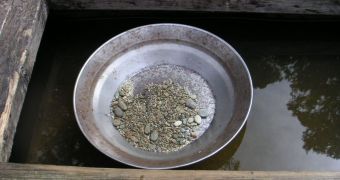Not everything that glitters is gold and no gold-digging process is risk-free. Scientists highlight that goal extraction implies the usage of mercury, presenting long-term risks for mine workers and communities located near the sites.
This alarming situation made the EU adopt strict regulations and ban the usage of mercury thermometers in 2008. Even so, the fact that gold almost tripled its value in a short period of time determined small mining communities to disregard the threats while aiming to increase their profits, according to the Ecologist.
The toxic element is used on a large scale, taking into consideration that it powers a simple, cost-effective method of separating the precious metal rocks and other compounds. Easy-to-follow steps don't guide gold-diggers to a safe path of becoming rich.
Almost 70% of the total amount of mercury used in the process ends up in waters, polluting the entire food chain. Women eat poisoned fish and the contamination is transmitted to the fetus in the womb, causing brain damage.
Since experts reached the conclusion that mercury is one of the most dangerous elements known and handled so far, organizations try to establish an international treaty on mercury, meant to regulate a stricter usage. 120 governments joined efforts to provide a safer legal framework.
Two of the most important goals represent the reduction of the atmospheric emission of mercury, followed by a fast, effective remediation of the contaminated sites.
Even if legal measures will be outlined in the near future, authorities will still have to find proper solutions for batteries, bulbs and other mercury-based items, considered waste and shipped to Africa.
New measures indicated by the treaty will be ready for implementation at the beginning of 2013, most likely not fast enough to ensure the safety of people from developing countries, eager to exploit the potential of the gold boom at any price.
According to a study, mercury poisoning is harming 15 million low-income miners, who struggle to survive while making less than $5,000 (€ 3,683) every year. Their job is underpaid, since they barely get 75% of the real price of gold.
In the last 10 years, due to gold's tripled value, the situation has gotten out of control. Experts say that artisanal, irresponsible mining operations are responsible for up to 1,000 tonnes of mercury reaching the atmosphere annually.
Surprisingly, one million children are exposed because they are forced to work in this field of activity, which puts their lungs at great risks, quite common in developing countries all across Asia, Africa and Latin America.

 14 DAY TRIAL //
14 DAY TRIAL //